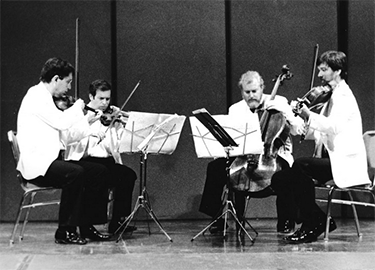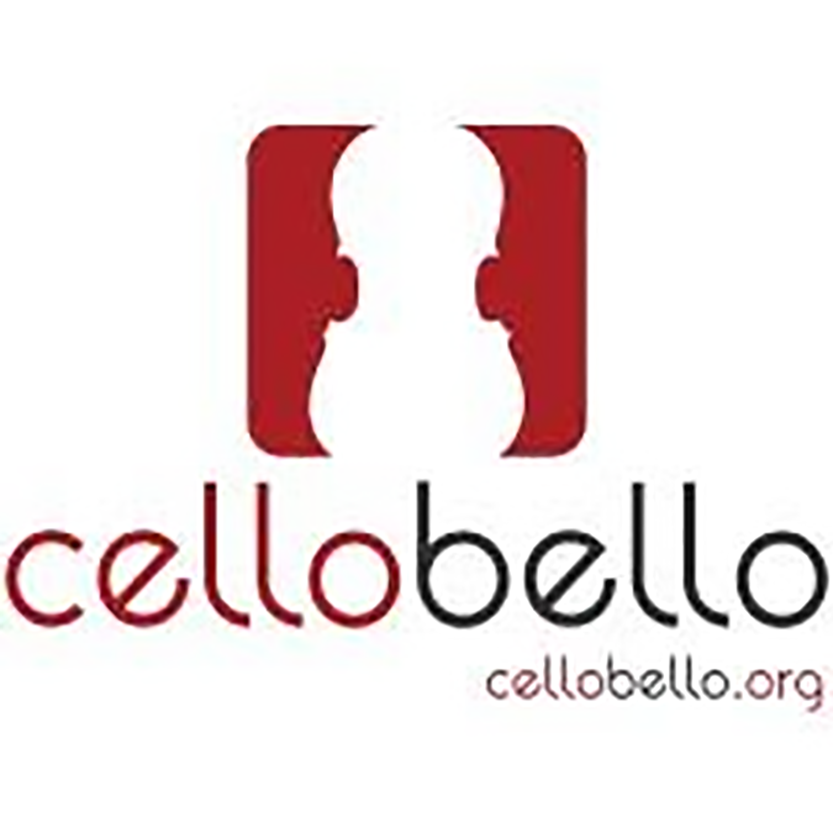by Mike Telin

But with the abolishing of Goskino in November of 1991 and the dissolution of the Soviet Union in December of that year, the film, although in its final edits, was never released. “I don’t know exactly how it resurfaced, but I noticed there was a video of Barber’s Adagio with the Cleveland Quartet on YouTube. It is footage from the film, so I thought that it had to live somewhere.”
On November 29 at 7:30 pm at Reinberger Chamber Hall in Severance Music Center, Notes From Behind the Iron Curtain: Cleveland Quartet’s 1988 Soviet Tour will finally receive its premiere. Following the screening, attendees will have the unique opportunity to engage in a Q&A session with Cleveland Quartet members.
The event will also include live performances by The Weilerstein Trio — pianist Vivian Hornik Weilerstein, violinist Donald Weilerstein, and cellist Alisa Weilerstein — and a cello ensemble of Cleveland Orchestra members including Mark Kosower, Richard Weiss, Charles Bernard, and Bryan Dumm. CelloBello, the world’s leading educational website for cellists, which was founded by Katz, is using the occasion to announce a significant expansion devoted to chamber music. Tickets are available online.
I began my conversation with Paul Katz by asking what happened when the Quartet was contacted by Goskino.
Paul Katz: We were a well-known string quartet, but what they wanted to do did feel a little bit over the top to us. Still they gave us a Russian producer, director, a film crew, all the cameras, all the equipment, and access for filming around the Soviet Union, which you couldn’t just do in those days. So they actually shouldered this entire project.
And then, less than a week before the trip, the director suffered a back problem and at the last moment, they brought in Fred Salaff, who is a filmmaker and the brother of Peter Salaff, our second violinist. So he flew to the Soviet Union and worked with a Russian film crew that didn’t speak English and he didn’t speak Russian, but he was the director.
Anyway, they did a good job and were in the final edits and needed to reduce it down to an American TV hour. But less than a year later Goscino and the Soviet Union collapsed and the film disappeared.
Mike Telin: How did you obtain a copy of the film?
Paul Katz: We wrote to the person who had put it on YouTube but they never answered. Anyway, we were able to get a copy of the film and gave it to a filmmaker here in Boston who happens to be Russian and was able to understand the Russian that’s in the film. He restored it, edited it down, and provided subtitles.
MT: Did you need to have your repertoire approved?
PK: I think we could bring whatever we wished. We actually commissioned a quartet from Christopher Rouse and there’s a small portion near the end of the film where we played it at a library for Russian composers and literary people. We also played the Ives Second Quartet — the Arguments movement is also in the film. And of course we also took the Barber Adagio, so we actually had three American composers. We also played Mendelssohn — there’s quite a bit of Mendelssohn in the film — and Beethoven Opus 130 with the Große Fuge.
MT: I have to congratulate you on the CelloBello website. What a resource for people even if they’re not a cellist.
PK: It took off in a way I could never have imagined, so it’s kind of thrilling to see and it’s kept me busy in my later years.
MT: What led you to start it?
PK: Back around 2005, a cellist who was getting a PhD at Harvard wanted to do her dissertation on my studio teaching. The idea was that what we do as an artform is passed down through the generations and can’t be taught in books, that sort of thing.
She wrote a 250-page dissertation that took me apart and put me back together again. So I learned a lot about myself. But Harvard wanted it to be a mixed media dissertation, so she had done a lot of filming in my studio. She got the idea to drag me into WGBH’s educational media foundation to make a DVD about cello pedagogy. That experience changed my life because they felt the future of education was not going to be a DVD, it was going to be websites. So they proposed to help me create one.
Part of the reason for the Cleveland event is to announce that CelloBello is expanding into chamber music. For example, the first violinist in the Borromeo Quartet is quite the Beethoven scholar, and they’re producing some fantastic stuff on Beethoven.
MT: I understand that Sony is releasing a box set of recordings the Cleveland Quartet made for them.
PK: Yes! A few months ago they called and said they wanted to do a retrospective CD box of all the recordings we made for RCA and the one we made for Sony, which was the Schubert Quintet with Yo-Yo Ma. And this box set of 23 CDs is going to be released on December 1. So during the event we’re going to have an auction going where people can bid on this box.
The set also includes the liner notes I wrote for our Beethoven Quartet Cycle. I’m not a historian and I’m not a theorist, so I wrote about the interpretive problems of the Beethoven Quartets. And that got me nominated for a Grammy for the liner notes. It didn’t win, but I was honored to have been nominated. They’re also included in the set.
MT: Paul, thank you very much, is there anything you’d like to add?
PK: Nothing other than I look forward to the event. It’s going to be a lot of fun.
Published on ClevelandClassical.com November 26, 2023.
Click here for a printable copy of this article




